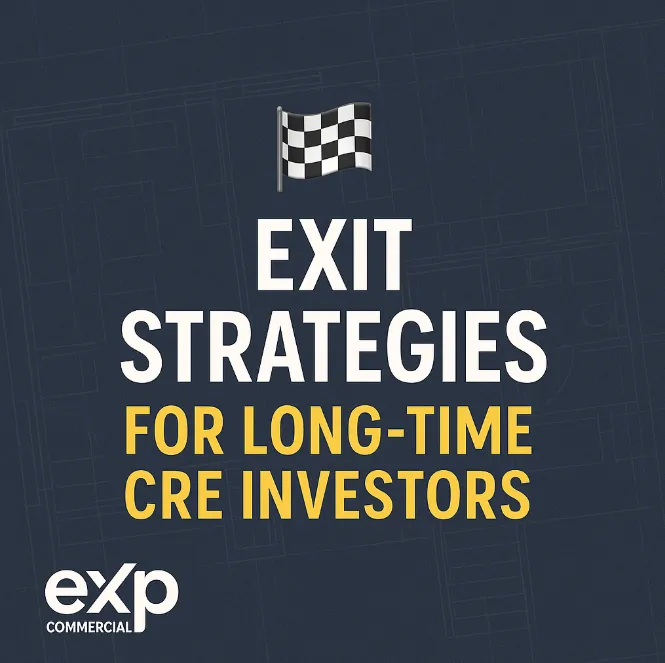Your Trusted Houston Commercial Real Estate Brokerage
Viking Enterprise LLC is part of eXp Commercial, an agent-led, cloud-based commercial real estate brokerage with agents across the globe.
Email: [email protected]
Call: (281) 222-0433
Your Trusted Katy / Fulshear & Houston Commercial Real Estate Brokerage
Viking Enterprise LLC is part of eXp Commercial, an agent-led, cloud-based commercial real estate brokerage with agents across the globe.
Looking to invest, buy, sell or lease? We can help.
Looking to invest, buy, sell or lease? We can help.
FEATURED PROPERTIES




OUR FEATURED TENANTS & CLIENTS
eXp Commercial - Viking Enterprise Team's real estate network provides unparalleled commercial real estate services to Tenants and Landlords around the Katy- Houston area. Our knowledge, experience, and reputation sets us apart from many firms.
A commercial property owner might have various plans that would necessitate the services of a commercial real estate broker. Some of the common scenarios include:
1. Selling the Property: If the owner decides it’s time to sell the property, a commercial real estate broker can help determine the market value, market the property effectively, and negotiate with potential buyers to get the best possible price.
2. Leasing Space: For property owners looking to lease out part or all of their commercial space, a broker can help find suitable tenants, negotiate lease terms, and ensure the lease agreements meet all legal requirements and serve the owner’s best interests.
3. Acquiring More Properties: Owners looking to expand their portfolio would benefit from a broker's knowledge of the market, access to listings, and negotiation skills to secure additional properties at favorable terms.
4. Property Management: While not all brokers offer this service, some commercial real estate brokers or their affiliates offer property management services. This can be particularly appealing for owners who prefer a hands-off approach or are managing properties from a distance.
5. Market Analysis: Owners considering future developments, renovations, or rebranding of their property might engage a broker for a comprehensive market analysis. This helps in understanding current market trends, the demand for different types of spaces, and potential returns on investment for various strategies.
6. Refinancing: In situations where a property owner is looking to refinance their property, a commercial real estate broker can provide valuable insights into the property’s current market value, assist in gathering necessary documentation, and even help in finding the best financing options.
7. Partnership or Investment Opportunities: Owners interested in exploring partnerships, joint ventures, or seeking investors for expansion or development projects might use a broker to find and vet potential partners or investors.
8. Consulting on Zoning and Use Changes: When contemplating a change in the use of the property or dealing with zoning issues, a broker with experience in local regulations and the specific property type can provide guidance and strategic planning assistance.
9. Exit Strategy Planning: For owners looking to plan an exit strategy from their investment, whether it’s through a strategic sale or a gradual winding down of operations, brokers can provide market insights, timing advice, and valuation services to optimize the exit process.
In any of these scenarios, the expertise and services provided by a commercial real estate broker can save the property owner time and money, while also providing access to a wider network of potential buyers, tenants, and industry professionals. Give us a call today!
Reviews

🏁 Exit Strategies Every Long-Time CRE Investor Should Know 💼
🏁 Exit Strategies Every Long-Time CRE Investor Should Know 💼
💡 How to Plan Your CRE Exit Strategy: Tips for Long-Time Investors 🏢
🏁 Exit Strategies for Long-Time CRE Investors
For many long-time commercial real estate (CRE) investors, holding onto properties has been the foundation of their wealth-building journey. But at some point, the focus shifts from acquisition to transition. Whether you’re nearing retirement, restructuring your portfolio, or simply ready to capitalize on gains, having a well-thought-out CRE exit strategy ensures you maximize returns while minimizing risk.
Here are the most common and effective exit strategies for seasoned CRE investors:
1. Traditional Sale
Selling your property outright is the most direct way to exit. In strong markets like Houston, investors can benefit from appreciation, high demand, and low cap rate environments. However, timing is critical—selling during a downturn could mean leaving money on the table.
2. 1031 Exchange
For investors looking to defer capital gains taxes, the 1031 exchange remains one of the most powerful tools. By rolling proceeds into a new investment property, you not only defer taxes but also keep your capital working for you. Many long-time owners use this strategy to transition into more passive property types, such as multifamily or net-leased assets.
3. Sale-Leaseback
This option allows an owner-operator to sell their property to an investor while leasing it back for continued business use. It frees up capital without disrupting operations—a win for business owners seeking liquidity.
4. Refinance & Hold
Not ready to sell? A cash-out refinance provides liquidity while you continue to enjoy property ownership and cash flow. This strategy is especially attractive when interest rates are favorable, allowing investors to redeploy capital into new opportunities without selling.
5. Legacy & Estate Planning
For long-time CRE investors, real estate often plays a central role in estate planning. Transferring property through trusts, family partnerships, or gifting strategies helps ensure assets are passed down efficiently, often with tax advantages.
6. REITs & Syndication Exit
Some investors choose to exit by selling to or merging with institutional players like REITs or syndications. This provides liquidity while benefiting from institutional-grade valuations.
🔑 Key Considerations for Your Exit
· Market Timing: Local supply/demand, interest rates, and economic cycles matter.
· Tax Implications: Consult a CPA or financial advisor before executing any exit.
· Personal Goals: Decide whether you want liquidity, passive income, or legacy transfer.
✅ Final Thoughts
Your exit strategy in commercial real estate is just as important as your acquisition strategy. Long-time CRE investors have built significant equity and wealth—but without a clear plan, much of that value can be lost to poor timing or taxes. Working with an experienced commercial broker and capital advisor ensures you maximize your return, whether through a sale, refinance, or legacy plan.
https://www.houstonrealestatebrokerage.com/
https://www.houstonrealestatebrokerage.com/houston-cre-navigator
https://www.commercialexchange.com/agent/653bf5593e3a3e1dcec275a6
http://expressoffers.com/[email protected]
https://app.bullpenre.com/profile/1742476177701x437444415125976000
https://author.billrapponline.com/
https://www.amazon.com/dp/B0F32Z5BH2
https://veed.cello.so/FOmzTty6oi9
© 2023-2024 Bill Rapp, Broker Associate, eXp Commercial Viking Enterprise Team
eXp Commercial - Viking Enterprise team real estate network provides unparalleled commercial real estate services to Tenants and Landlords around the greater Katy & Houston MSA area. Our knowledge, experience, and reputation sets us apart from many firms.
A commercial property owner might have various plans that would necessitate the services of a commercial real estate broker. Some of the common scenarios include:
1. Selling the Property: If the owner decides it’s time to sell the property, a commercial real estate broker can help determine the market value, market the property effectively, and negotiate with potential buyers to get the best possible price.
2. Leasing Space: For property owners looking to lease out part or all of their commercial space, a broker can help find suitable tenants, negotiate lease terms, and ensure the lease agreements meet all legal requirements and serve the owner’s best interests.
3. Acquiring More Properties: Owners looking to expand their portfolio would benefit from a broker's knowledge of the market, access to listings, and negotiation skills to secure additional properties at favorable terms.
4. Property Management: While not all brokers offer this service, some commercial real estate brokers or their affiliates offer property management services. This can be particularly appealing for owners who prefer a hands-off approach or are managing properties from a distance.
5. Market Analysis: Owners considering future developments, renovations, or rebranding of their property might engage a broker for a comprehensive market analysis. This helps in understanding current market trends, the demand for different types of spaces, and potential returns on investment for various strategies.
6. Refinancing: In situations where a property owner is looking to refinance their property, a commercial real estate broker can provide valuable insights into the property’s current market value, assist in gathering necessary documentation, and even help in finding the best financing options.
7. Partnership or Investment Opportunities: Owners interested in exploring partnerships, joint ventures, or seeking investors for expansion or development projects might use a broker to find and vet potential partners or investors.
8. Consulting on Zoning and Use Changes: When contemplating a change in the use of the property or dealing with zoning issues, a broker with experience in local regulations and the specific property type can provide guidance and strategic planning assistance.
9. Exit Strategy Planning: For owners looking to plan an exit strategy from their investment, whether it’s through a strategic sale or a gradual winding down of operations, brokers can provide market insights, timing advice, and valuation services to optimize the exit process.
In any of these scenarios, the expertise and services provided by a commercial real estate broker can save the property owner time and money, while also providing access to a wider network of potential buyers, tenants, and industry professionals. Give us a call today!

Find the perfect location for your business.
Let us help your business succeed.

🏁 Exit Strategies Every Long-Time CRE Investor Should Know 💼
🏁 Exit Strategies Every Long-Time CRE Investor Should Know 💼
💡 How to Plan Your CRE Exit Strategy: Tips for Long-Time Investors 🏢
🏁 Exit Strategies for Long-Time CRE Investors
For many long-time commercial real estate (CRE) investors, holding onto properties has been the foundation of their wealth-building journey. But at some point, the focus shifts from acquisition to transition. Whether you’re nearing retirement, restructuring your portfolio, or simply ready to capitalize on gains, having a well-thought-out CRE exit strategy ensures you maximize returns while minimizing risk.
Here are the most common and effective exit strategies for seasoned CRE investors:
1. Traditional Sale
Selling your property outright is the most direct way to exit. In strong markets like Houston, investors can benefit from appreciation, high demand, and low cap rate environments. However, timing is critical—selling during a downturn could mean leaving money on the table.
2. 1031 Exchange
For investors looking to defer capital gains taxes, the 1031 exchange remains one of the most powerful tools. By rolling proceeds into a new investment property, you not only defer taxes but also keep your capital working for you. Many long-time owners use this strategy to transition into more passive property types, such as multifamily or net-leased assets.
3. Sale-Leaseback
This option allows an owner-operator to sell their property to an investor while leasing it back for continued business use. It frees up capital without disrupting operations—a win for business owners seeking liquidity.
4. Refinance & Hold
Not ready to sell? A cash-out refinance provides liquidity while you continue to enjoy property ownership and cash flow. This strategy is especially attractive when interest rates are favorable, allowing investors to redeploy capital into new opportunities without selling.
5. Legacy & Estate Planning
For long-time CRE investors, real estate often plays a central role in estate planning. Transferring property through trusts, family partnerships, or gifting strategies helps ensure assets are passed down efficiently, often with tax advantages.
6. REITs & Syndication Exit
Some investors choose to exit by selling to or merging with institutional players like REITs or syndications. This provides liquidity while benefiting from institutional-grade valuations.
🔑 Key Considerations for Your Exit
· Market Timing: Local supply/demand, interest rates, and economic cycles matter.
· Tax Implications: Consult a CPA or financial advisor before executing any exit.
· Personal Goals: Decide whether you want liquidity, passive income, or legacy transfer.
✅ Final Thoughts
Your exit strategy in commercial real estate is just as important as your acquisition strategy. Long-time CRE investors have built significant equity and wealth—but without a clear plan, much of that value can be lost to poor timing or taxes. Working with an experienced commercial broker and capital advisor ensures you maximize your return, whether through a sale, refinance, or legacy plan.
https://www.houstonrealestatebrokerage.com/
https://www.houstonrealestatebrokerage.com/houston-cre-navigator
https://www.commercialexchange.com/agent/653bf5593e3a3e1dcec275a6
http://expressoffers.com/[email protected]
https://app.bullpenre.com/profile/1742476177701x437444415125976000
https://author.billrapponline.com/
https://www.amazon.com/dp/B0F32Z5BH2
https://veed.cello.so/FOmzTty6oi9
© 2023-2024 Bill Rapp, Broker Associate, eXp Commercial Viking Enterprise Team
Find the perfect location for your business.
Let us help your business succeed.
9600 Great Hills Trail, Suite 150w Austin, TX 78759 |
855.450.0324 xx255
Texas Real Estate Commission Consumer Protection Notice Texas Real Estate Commission
Information About Brokerage Services eXp Commercial LLC #9010212
Viking Enterprise LLC #9009614

Sign up to receive the latest news on property investment and commercial real estate listings.
Contact Us
901 S Mopac Expwy, Bldg 2, Suite 350 Austin, TX 78746 | 512.474.5557Texas Real Estate Commission
Consumer Protection Notice Texas Real Estate Commission Information About Brokerage Services Reliance Retail, LLC #603091
Texas RS, LLC #9003193 | RESOLUT RE Is Licensed In Louisiana #0995694083


Facebook
Instagram
X
LinkedIn
Youtube
TikTok